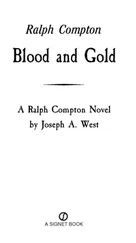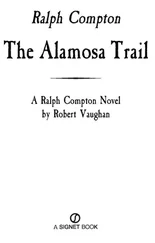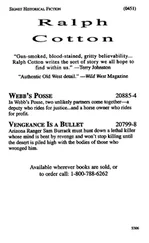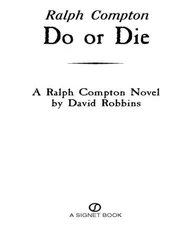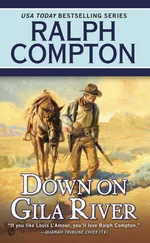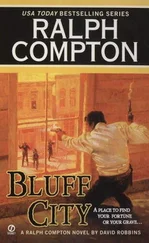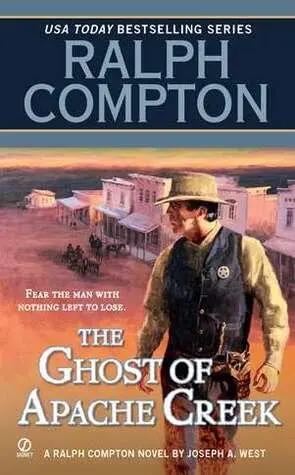

NOWHERE TO RUN
Here the moonlight seemed brighter, though the land in front of her lay angled in deep shadow.
Then she saw it—a single pinpoint of light in the distance. A campfire maybe.
But how distant? It could have been one mile or ten. She had no way of knowing.
Jess heard a stealthy rustle in the grass behind her, and fear gave wings to her feet. She hiked up her skirts again and ran down the rise, heedless of the tree branches that slapped and swatted at her.
Then she was on flat grassland and right ahead of her was a town.
Sobbing her relief, Jess ran. She passed a darkened church and went on into the middle of the street.
She stopped in a patch of shadow cast by one of the false-fronted buildings, looking around her. The light she’d seen from the rise was straight ahead of her, throwing a pale yellow rectangle onto the street.
She prepared to run again, but the coyotes, heads down, growling, had cut her off and were now standing directly in her path.
Jess backed away, out of the shadow and into the moonlight.
The coyotes stalked closer, readying their attack.
She screamed for help—then she screamed again.
Her shrieks echoed through the silent town and came back at her. Mocking her.
THE IMMORTAL COWBOY
This is respectfully dedicated to the “American Cowboy.” His was the saga sparked by the turmoil that followed the Civil War, and the passing of more than a century has by no means diminished the flame.
True, the old days and the old ways are but treasured memories, and the old trails have grown dim with the ravages of time, but the spirit of the cowboy lives on.
In my travels—to Texas, Oklahoma, Kansas, Nebraska, Colorado, Wyoming, New Mexico, and Arizona—I always find something that reminds me of the Old West. While I am walking these plains and mountains for the first time, there is this feeling that a part of me is eternal, that I have known these old trails before. I believe it is the undying spirit of the frontier calling me, through the mind’s eye, to step back into time. What is the appeal of the Old West of the American frontier?
It has been epitomized by some as the dark and bloody period in American history. Its heroes—Crockett, Bowie, Hickok, Earp—have been reviled and criticized. Yet the Old West lives on, larger than life.
It has become a symbol of freedom, when there was always another mountain to climb and another river to cross; when a dispute between two men was settled not with expensive lawyers, but with fists, knives, or guns. Barbaric? Maybe. But some things never change. When the cowboy rode into the pages of American history, he left behind a legacy that lives within the hearts of us all.
—Ralph Compton
Chapter 1
Dry lightning shimmered silver on the warped timbers of the town, imparting a fleeting beauty. A hard wind broke in waves over the Mogollon Rim to the south, crested, and then rampaged north toward the peaks and mesas of the White Mountains, picking up ragged veils of sand as it went.
The wind venomously hurled the sand against the ghost town of Requiem as though trying to wake the place from its deep slumber. Stinging grit cartwheeled along Main Street and rattled against the cracked glass of store windows, threatening to break them further. Rusty-hinged doors squealed and slammed in the tempest, and the wind shrieked like a virgin saint forced to take partners for the Devil’s barn dance.
A tall man walked through this maelstrom of wind, sand, and darkness, his head bent, seemingly oblivious to his surroundings. His boots thudded on the boardwalk, the chime of his spurs faint in the storm’s roar. He stepped along slowly, shoulders hunched, long hair tumbling down his ragged back.
The man could have been a sleepwalker, lost in a nightmare, or a wandering drifter seeking shelter from the storm. But Marshal Sam Pace was neither of those things. He was aware. Alert. Ready. And he was listening. The dead were talking.... He heard their thin whispers in the wind.
He stopped and lifted his head, his eyes bright.
“Is that you?” he said, raising his voice to a shout. “John Andres, is that you calling to me?”
He listened into the night, hard-driven sand hissing over him.
Pace opened the twisted door of Big John’s Bakery and Pie Shop and stepped inside; the storm, frustrated for the moment, let him go.
“John?” Pace said. “Why did you call out to me?”
The bakery was angled in deep shadow. Its shelves were empty, gray with cobwebs, and the place smelled of pack rats and dry rot.
“Where the hell are you, John?” Pace said. “Martha, are you there?”
Something rustled in a corner. The wind pounded at the store window, demanding entry. The door grated on its hinges.
But the pie shop was a tomb, dark, empty, without human life.
Sudden realization spiked in Pace, startling him.
There was no one here. Not a soul.
Big John, big laughing John Andres, who had won a medal at Gettysburg and another at Cold Harbor, was dead of the cholera these past three years. He’d buried Martha himself, a plump, rosy-cheeked woman who’d baked the best apple pie in the county and made biscuits so light they almost floated. John and Martha had moldered long in the ground and nothing about them would look human any longer.
Still, he tried again. “John? Martha? Are you there?”
A hollow silence mocked him. Outside, the wind raved and ranted, impatient for his return.
Pace stumbled to the door and once again stepped into uproar.
But wait. He was in no rush to walk again. It was time for thought.
He sheltered in a store doorway, feeling crafty, because he knew there was much mischief afoot. Chin in hand, he pondered the wind. Aha , now he knew. It came from the northwest.
“Do you know what that means, Sam?” he said aloud.
He answered his own question, the habit of a man who has spent too much time alone.
“Sure do, Sam. It means you’ll only be insane until the wind shifts.”
Pace nodded and smiled. He was happy that he’d gotten to the truth of the thing.
Earlier in the day, the wind had blown from the south, and he’d been perfectly sane. But within the last hour it had shifted. When it blew from the south again, he’d be his old rational self.
William Shakespeare said he would, and ol’ Will knew about such things, him being a famous playwright an’ all.
“I am but mad north-north west. When the wind is southerly I know a hawk from a handsaw.”
For some reason, Pace had always remembered that quote since he’d heard an actor say it at a theater in Deadwood, and it tickled him. He said it aloud. Then once again.
But another thought silenced him.
“Sam,” he said aloud, his face puzzled, “when the wind was from the south, how come you were still crazy as a loon?”
Pace shook his shaggy head.
“Sam doesn’t know,” he said. He thought about it. “I reckon ol’ Will Shakespeare has some explaining to do. That’s what I think.”
The marshal stumbled into the street, and again got pummeled by wind and hammered by stinging sand.
“Will Shakespeare!” he yelled, throwing his arms wide, his head back. “You know nothing! You don’t know shit!” He laughed, an empty noise without humor. “Damn you, when the wind was from the south I was still stark, raving mad and I didn’t know a hawk from a handsaw!”
Читать дальше



